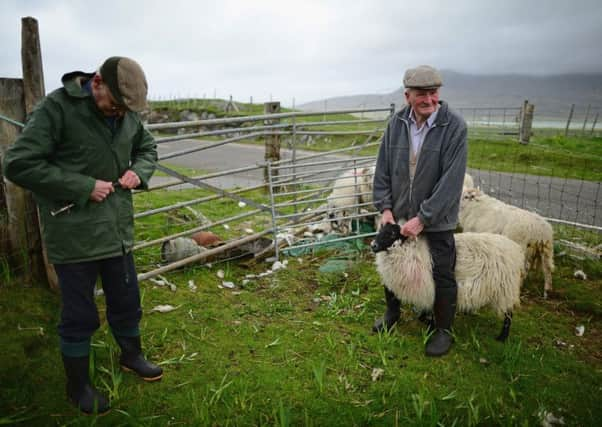Brian Wilson: Is dogma digging a hole for crofting?


Labour MSP Rhoda Grant has tabled parliamentary questions for answer next week. Will ministers institute an inquiry into the workings of the Crofting Commission and do they have confidence in its convener, Colin Kennedy?
These are likely to concentrate at least a few minds. While great affairs unfold elsewhere, it is difficult for such peripheral matters to force their way on to any agenda. Yet those who care about the very survival of a uniquely Scottish system of landholding – as much social as agricultural – should be paying attention.
Advertisement
Hide AdAdvertisement
Hide AdThe commission is a quango answerable to Scottish ministers which exists to regulate the crofting system. Critics say its recent behaviour “threatens the existence of crofting as a communal activity”. The Scottish Crofting Federation (SCF) detects “an inexplicable case of a public body confusing legal dogma with good sense”.
One of the ministerially appointed commissioners, William Swann, resigned this month. Convener Colin Kennedy was appointed last year after the resignation of his predecessor. He has been accused of “overbearing” behaviour and is widely seen as a key figure in the current conflict which flows from interpretations of crofting law which are, at best, highly contentious.
The affairs of crofting villages are overseen by elected Grazings Committees. The commission has tossed a grenade into crofting with its recent edict that the modest funds these voluntary bodies hold, mainly arising from agricultural and environmental grants, must be distributed as personal income to individual shareholders in the villages.
This money would then be subject to taxation and Grazings Committees will then have to ask individual shareholders, who might live in Kent or Australia, to return it for the purposes intended.
Two Grazings Committees in Lewis which were found not to have complied were suspended by the commission and replaced by Grazings Constables – the crofting vocabulary is nothing if not esoteric. In April, as controversy grew, Mr Kennedy issued guidelines to Grazings Committees which told them that “it is the duty of the Grazings Clerk to distribute monies from whatever source… to individual shareholders, whether or not they are active crofters”. They must then “levy and recover the required monies directly from the shareholders for onward payment to any third parties”.
The commission now claims it only intervened in two villages, Upper Coll and Mangersta, in response to complaints. However, critics point out that the law cannot be so selective. If it applies to two, then it must apply to the thousand of other Grazings Committees throughout the Highlands and Islands, with (if the commission is to believed) HMRC waiting to pounce.
Many fear that no Grazings Committee will seek funding for village activities if the money then has to be distributed to individuals, many absentee or inactive, and returned at their discretion.
The former Mangersta Grazings Committee told the commission it will have “no part in this abuse of public funds”. The SCF describes it as “nonsensical”.
Advertisement
Hide AdAdvertisement
Hide AdThe historic role of crofting tenure has been to retain significant populations in places where they would otherwise be sparse. Ten thousand acres of sporting estate might sustain half a dozen families whereas crofting has kept hundreds in similar spaces.
However, 21st century reality is that crofting depends on an ever-decreasing number of committed individuals trying to keep the system alive under hostile circumstances. Like other aspects of the cultures it is associated with, crofting depends on there being enough people to sustain it. In many places, that is barely the case.
There are damn lies and population statistics which present an upbeat impression of a booming Highlands and Islands. In fact, the growth has come in the city of Inverness and its precincts while the more peripheral areas, both island and mainland, continue to suffer out-migration and decline.
One result is that many crofts are unworked and, essentially, traded as house sites in beautiful places. There have long been forces, particularly in Edinburgh, which would prefer to see the whole troublesome system consigned to the silage pit of history, to be replaced by a free market in individual landholdings.
For the time being at least, that is not what the law says and so the Crofting Commission struggles to regulate its outposts from the bureaucratic grandeur of Great Glen House, Inverness.
Those who seek to maintain crofting on a communal basis are a minority in most villages. Through their Grazings Committees, they access schemes designed for farmers and informally adapted to fit the collective basis of crofting. The current controversy is an extension of this inherent conflict between individualism and a system which is, by definition, communal.
One thing crofting has in plenty is legislation. The Crofting Commission attributes its recent rulings to the requirements of the 1993 Crofting Act, although nobody has sought to enforce them in the intervening 23 years. “Why now and so destructively?” asks the Scottish Crofting Federation.
The most recent Crofting Act was passed in 2010. By common consent, it evaded all significant issues affecting the good health of crofting communities while its most radical reform was to change the name of the Crofters Commission to the Crofting Commission.
Advertisement
Hide AdAdvertisement
Hide AdThe immediate question is whether the Scottish Government is prepared to back their quango’s interpretation of the law and its heavy-handed approach to enforcement.
In the short term, a rapid inquiry into why the Crofting Commission has got itself into this mess and how it can be helped out of it may seem a relatively attractive option.